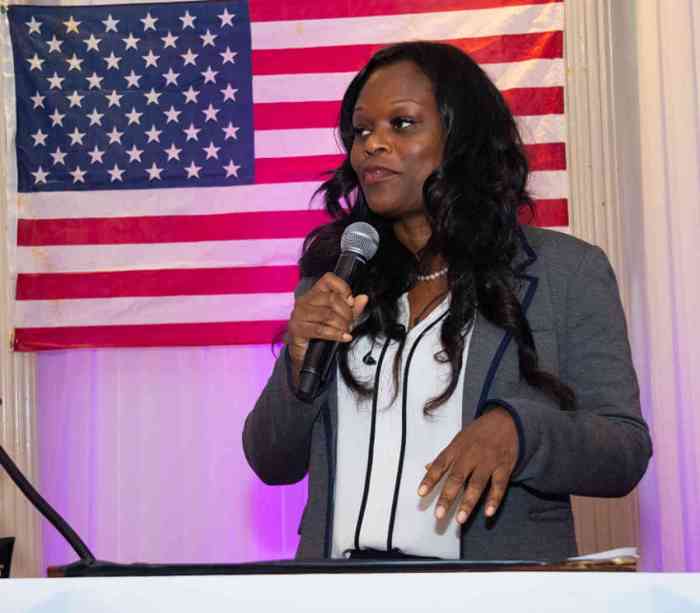Women’s History Month Celebration
On International Women’s Day and Women’s History Month 2022, the City University of New York (CUNY) says it is celebrating record representation of women in positions of leadership across the system, including a recent study that found that the CUNY Graduate Center is the second-most gender diverse higher education institution in the country.
“The pursuit and achievement of gender parity marks a significant step to ensure diversity among a university’s leadership, which has been demonstrated to improve efficiency and innovation and to elevate outcomes for students,” said Chancellor Félix V. Matos Rodríguez in a statement.
“As the chancellor, I have made it a priority to assemble a leadership team that reflects the full diversity of CUNY’s students, which, in turn, parallels that of New York City,” he added. “We are proud to lead the way in expanding representation among women in senior leadership roles, and providing networking and advancement opportunities for the women of our faculty, staff and student body.”
CUNY referred to a recent report in which the Eos Foundation and the American Association of University Women named the CUNY Graduate Center as the nation’s second-most gender diverse higher education institution in the country for its representation of women in positions of senior leadership.
According to CUNY, the report examined the diversity of presidents, provosts, board chairs, academic deans, presidents’ cabinets and governing boards among the 130 universities designated as R1, the highest classification for research institutions.
The Graduate Center, according to the report, is one of only 11 R1 universities to have achieved gender parity, defined as equal or more women represented in senior leadership, when compared to men.
The report also says that the Graduate Center is closest to reaching gender parity among professors: 43 percent of full tenured professors at the Graduate Center are women.
CUNY said this recognition includes the CUNY Graduate Center and five other schools that come under the Graduate Center’s administrative purview: The Craig Newmark Graduate School of Journalism at CUNY, CUNY School of Labor and Urban Studies, CUNY Graduate School of Public Health & Health Policy, CUNY School of Professional Studies and Macaulay Honors College.
“Welcoming women into the highest ranks is a CUNY Graduate Center tradition that stretches back to our founding by Mina Rees, a noted mathematician and fellow scientist,” said Graduate Center President Robin L. Garrell. “That history, coupled with the fact that women leaders are actively recruited and highly valued at CUNY, drew me to CUNY and the Graduate Center in 2020.
“The Eos Foundation report affirms that we continue to be at the forefront in promoting women leaders,” Dr. Garrell added. “As a chemist who was once the only woman in my academic department, I am passionate about cultivating an academic environment in which women faculty and students in all disciplines and of all backgrounds can thrive.”
CUNY said that the history of women leading the Graduate Center, one of only six schools in the report to have had at least three women serve as president, dates to its founding.
Dr. Rees was appointed as the first president of the Graduate Center in 1969 after serving as CUNY’s founding dean of graduate studies, CUNY said.
It said Frances Degen Horowitz served as president from 1991 to 2005, and Dr. Garrell is the third and current woman at the helm.
CUNY said that securing strong women leaders extends beyond CUNY’s esteemed hub of research and graduate education.
It said particular strides have been made during the tenure of Chancellor Matos Rodríguez, who began leading the university in May 2019.
CUNY said over half of the chancellor’s leadership team are women, adding that a majority of those individuals are people of color, representing a system in which nearly 60 percent of the students identify as women.
The latest to take on a top-level role is Wendy F. Hensel, who was recently appointed executive vice chancellor and university provost, the number two leadership role at the university, CUNY said. She begins her tenure on Jun. 1.
CUNY said it has also appointed women to serve as president of six colleges during the chancellor’s tenure, including Dr. Garrell; pioneering Dominican Republic studies scholar and Hostos Community College President Daisy Cocco de Filippis, the first Dominican Republic woman to lead a CUNY college; York College President Berenecea Johnson Eanes, a noted student affairs professional; Queensborough Community College President Christine Mangino, a proud champion for community college education; and innovative educator Patricia Ramsey, the first woman in the top role at Medgar Evers College.
CUNY said they join the five other women at the helm of CUNY colleges: Brooklyn College President Michelle J. Anderson, Hunter College President Jennifer J. Raab, John Jay College of Criminal Justice President Karol V. Mason, Kingsborough Community College President Claudia V. Schrader and Craig Newmark Graduate School of Journalism Dean Sarah Bartlett.
Most recently, CUNY said it appointed legal scholar Sudha Setty to lead the CUNY School of Law, beginning Jul. 1, the first person of South Asian descent to lead a CUNY school.
With women currently leading 11 of CUNY’s 25 colleges, including Macaulay Honors College Interim Dean Vanessa K. Valdés, CUNY said 44 percent of the system’s colleges are led by women — “greatly outpacing the R1 universities, where only 22 percent of presidents are women.”
Further, CUNY said six of these leaders are women of color, comprising 28 percent of CUNY’s presidents.
“This eclipses the 5 percent among the R1 universities,” CUNY said.
For Chancellor Matos Rodríguez, the pursuit of gender parity comes as a natural extension of his academic career, according to CUNY.
A noted historian of Latino studies, whose scholarship has focused on Puerto Rican women’s and feminist history, the chancellor has authored and edited six books, CUNY said.
It said Matos Rodríguez’s 2005 collection of writings by noted Puerto Rican feminist and labor organizer Luisa Capetillo, “A Nation of Women: An Early Feminist Speaks Out,” was reissued in paperback by Penguin Classics late last year.
CUNY said the chancellor recorded an audio version of the book’s revised introduction.
It said CUNY has long been a home for renowned women faculty. Groundbreaking physics researcher Myriam P. Sarachik found a home at City College in 1964, at a time when it was very rare for women scientists to secure full-time faculty appointments, CUNY said.
It said Dr. Sarachik, a distinguished professor emerita who passed away in October 2021, received the 2020 American Physical Society Medal for Exceptional Achievement in Research, one of the highest honors in her field.
Continuing this trend, CUNY said the Graduate Center has had two professors elected to the prestigious American Academy of Arts and Sciences in recent years: Professor Ruth Wilson Gilmore in 2021 and presidential professor Miranda Fricker in 2020.
CUNY said women on faculty have also had many successes in humanities and the arts.
Last year, it said Tania León, distinguished professor emeritus at Brooklyn College, won the 2021 Pulitzer Prize in Music.
Three CUNY educators were awarded Guggenheim Fellowships in 2020: Helen Phillips and Sigrid Nunez at Brooklyn College, and Valerie Tevere at College of Staten Island, CUNY said.
In 2019, it said decorated poet and Baruch College distinguished professor Grace Schulman was elected to the American Academy of Arts and Letters.
CUNY also said that distinguished professor Kimiko Hahn of Queens College received the American Book Award in 2016 and earned the PEN/Voelcker Award for Poetry in 2008.
Leading sociologist and oft-cited labor movements expert Ruth Milkman serves as distinguished professor at the Graduate Center and CUNY SLU, while internationally renowned social scientist Frances Fox Piven is a distinguished professor emerita at the Graduate Center, who first joined the faculty there in 1982, CUNY said.
It said acclaimed feminist writer Bell Hooks, who died in December 2021, was a distinguished professor of English at City College.
Poet and civil rights activist Audre Lorde taught at Lehman College and John Jay College before becoming the distinguished Thomas Hunter chair in English at Hunter College, where she previously earned her bachelor’s degree, CUNY said.
To help all women who work at CUNY build skills to expand their networks and chart a course for their own career advancement that aims toward positions of leadership, CUNY said it launched an annual Women’s Leadership Conference in 2005 and added a second event, the CUNY Career Compass for Women Leaders Conference, in 2020.
The third annual Career Compass conference took place on Mar. 16 and Mar. 18 with a theme of “Turning Your Passion Into Action,” featuring professional development seminars and remarks by Chancellor Matos Rodríguez, CUNY Trustee Herminia Palacio and Glenda G. Grace, senior vice chancellor for institutional affairs, strategic advancement and special counsel, CUNY said.
The conference’s keynote remarks were given by Deputy Mayor Sheena Wright.
Founded in 1847as the nation’s first free public institution of higher education, CUNY today has seven community colleges, 11 senior colleges and seven graduate or professional institutions spread across New York City’s five boroughs, serving over 260,000 undergraduate and graduate students, and awarding 55,000 degrees each year.
CUNY said its mix of quality and affordability “propels almost six times as many low-income students into the middle class and beyond as all the Ivy League colleges combined.”
“More than 80 percent of the university’s graduates stay in New York, contributing to all aspects of the city’s economic, civic and cultural life, and diversifying the city’s workforce in every sector,” CUNY said.
It said its graduates and faculty have received many prestigious honors, including 13 Nobel Prizes and 26 MacArthur “Genius” Grants.
CUNY said its historic mission continues to this day: “Provide a first-rate public education to all students, regardless of means or background.”
























